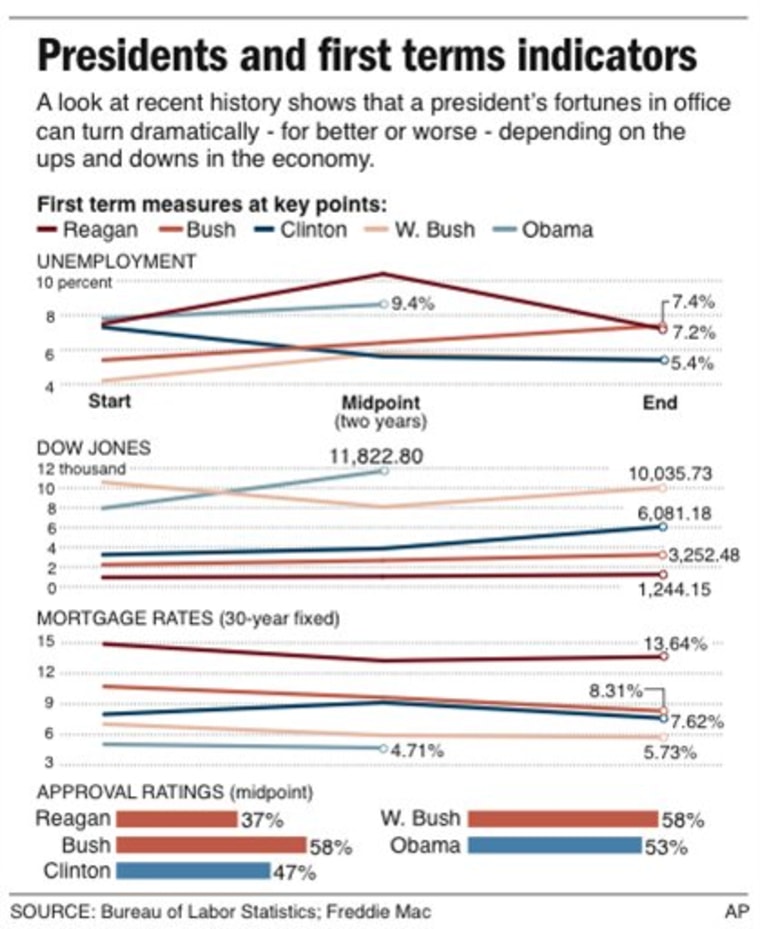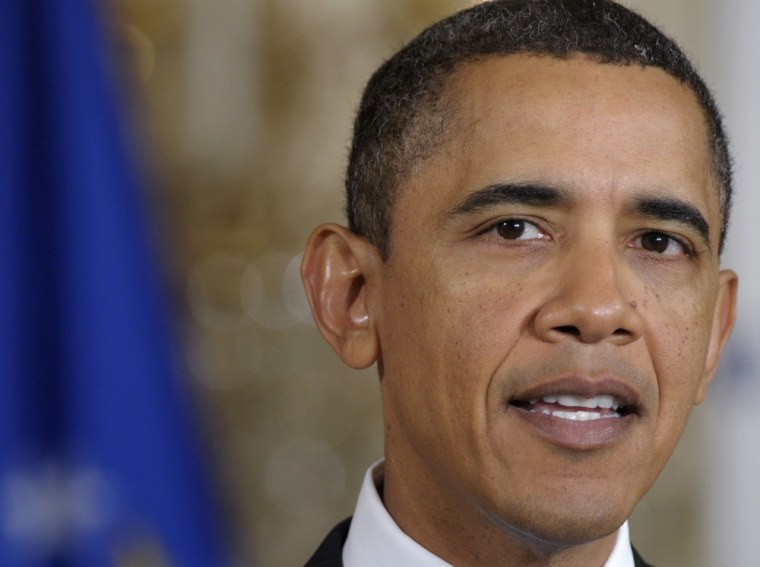Facing high unemployment and lukewarm public approval, President Barack Obama can take heart from history: At the same point in his presidency 28 years ago, Ronald Reagan was saddled with an approval rating much lower than Obama's is now. And the unemployment rate then was a full percentage point higher.
For Reagan, the economy soon recovered quickly and strongly, carrying him to re-election in 1984, one of the biggest landslides in U.S. political history. It's possible Obama could benefit from an equally robust economic revival before Election Day 2012. But expectations are lower this time, because the government has already used up most of its tools to boost the economy.
Recent history suggests a president's fortunes can turn dramatically, for better or worse, on economic swings from the halfway mark of his first term to the next Election Day. Here are some examples:
—PRESIDENT RONALD REAGAN:
Midway through his first term, Reagan's approval rating was 37 percent. No wonder. When Reagan delivered his State of the Union address in January 1983, the unemployment rate was at 10.4 percent — nearly 3 percentage points higher than when he took office.

Federal Reserve Chairman Paul Volcker had pushed interest rates as high as 20 percent to slow the economy and snuff out inflation. He succeeded. But the result was the deepest recession since the Great Depression. Political pundits wrote Reagan off as a one-term president.
Yet once he whipped inflation, Volcker reversed course and lowered interest rates. Reagan's tax cuts also jolted the economy. By Election Day 1984, the unemployment rate had fallen to 7.2 percent and was still dropping. Proclaiming the arrival of "Morning in America," Reagan won another four years in the White House.
—PRESIDENT GEORGE H.W. BUSH:
A little more than two years into his presidency, George H.W. Bush looked invincible. His approval rating had hit 89 percent after the U.S. military drove Saddam Hussein's Iraqi forces from Kuwait in February 1991.
But a weak economy extinguished Bush's hopes for re-election. The military triumph in the Gulf temporarily lifted Bush's popularity after the United States slid into recession. Rising unemployment, though, gradually took a toll. So did the perception that Bush had lost touch with voters who were struggling financially. His opponent in the 1992 election, Bill Clinton, famously built his campaign around the phrase, "It's the economy, stupid."
By November, the unemployment rate was 2 percentage points higher than when Bush took office. Bush lost his re-election bid in a three-way race with Clinton and independent candidate Ross Perot. The next month, a panel of economists decreed that the recession had officially ended in March 1992, eight months before Election Day.
—PRESIDENT BILL CLINTON
Bill Clinton was floundering after two years in the White House. His health care reform plan had failed. In the 1994 midterm election, Republicans had seized back control of both the House and Senate. Clinton's approval rating was at 47 percent.
But over the next two years, a strengthening economy, and a successful budget standoff against congressional Republicans, reversed Clinton's fortunes. From his inauguration through Election Day 1996, the unemployment rate fell from 7.3 percent to 5.4 percent. The Dow Jones industrial average shot up 88 percent. In November, Clinton scored an easy victory over Sen. Bob Dole and Perot.
—PRESIDENT GEORGE W. BUSH
Attention to terrorism and war overshadowed George W. Bush's first term, despite an eight-month recession in 2001 and a slow recovery that produced few jobs. After the 9/11 attacks on New York and Washington in 2001, the nation rallied around Bush as he prepared for the March 2003 invasion of Iraq.
Two years into his presidency, Bush's approval rating was 58 percent, even though unemployment was higher and the stock market lower than when he took office. His approval rating would top 70 percent after U.S. troops occupied Baghdad in April 2003.
From there, Bush's approval rating would fall steadily. The unemployment rate rose from 4.2 percent, when Bush entered the White House, to 5.4 percent on Election Day 2004. By then, the economy had lost jobs since the president had taken office. Even so, Bush managed to score a solid victory over Sen. John Kerry in November 2004.
—PRESIDENT BARACK OBAMA
President Barack Obama's popularity could be worse considering the unemployment rate remains 9.4 percent more than a year after the recession ended. An Associated Press-GfK poll found that 53 percent of Americans approve of how Obama is governing, a middle-of-the-pack ranking for presidents in their second year.
More than half of Americans disapprove of his handling of the economy. Only 35 percent say it's improved on his watch. That's down from 40 percent a year earlier.
Yet "he's clearly ahead of Reagan" at similar points in their presidencies, says Andrew Kohut, president of the Pew Research Center.
Obama also shares one of Reagan's enduring strengths: People like him. In the AP-GfK poll, 83 percent of Americans call Obama likable, 62 percent label him a strong leader and 61 percent say he's in touch with ordinary people.
Analysts expect the economy to pick up speed between now and Election Day 2012. But Obama can't benefit as Reagan did from aggressive interest rate cuts by the Fed. Fed Chairman Ben Bernanke has practically run out of ammunition, having already lowered short-term interest rates to near zero. So Obama faces the risk that unemployment will remain high when voters decide whether he deserves four more years.
And his re-election hopes could be undermined in other unpredictable ways — a severe setback in Afghanistan, for instance.
Still, Intrade Prediction Markets, which lets investors bet on election results and other events, puts Obama's chances to remain in the White House beyond 2012 at around 60 percent.
